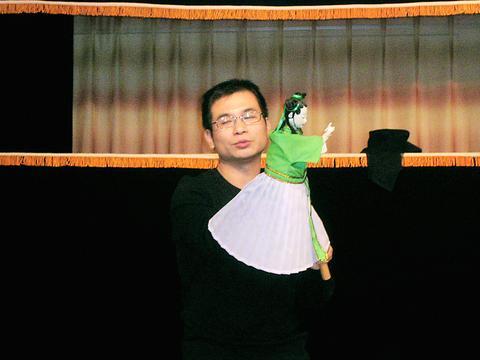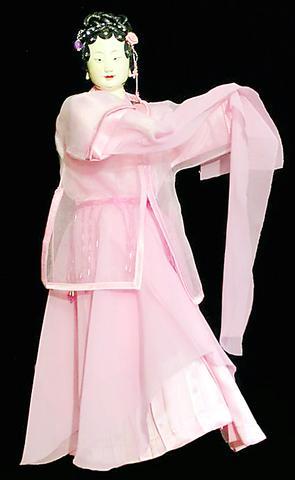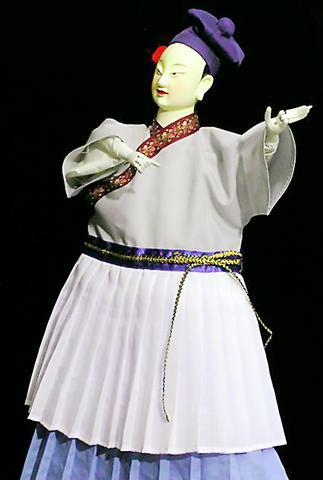This weekend, hopeless romantics can find a mini version of the poor-boy-meets-rich-girl at Crown Arts Theater Center, where The Happy Puppetry Company will put on the puppet version of a Taiwanese play whose name is now synonymous with marrying for love: Chen San Wu Niang.
Written in the early days of Taiwanese opera, Chen San Wu Niang tells the story of forbidden love. Chen San is a young man from a family of poor officials who falls in love with the fifth daughter of the wealthy Huang family, Wu Niang. To get closer to his beloved, Chen San enters the Huang court posing as a cleaner of mirrors. He intentionally breaks a mirror, and to compensate must become a slave of the Huang family. Unfortunately, he finds that Wu Niang is promised to the smarmy aristocrat Lin Dai (

PHOTO: MEREDITH DODGE, TAIPEI TIMES
According to director Ke Shi-hong (柯世宏), the theme of the triumph of love over tradition gives the story a modern edge. Perhaps Ke, whose grandmother founded the troupe, chose the play to fit his vision of a traditional puppet show -- with a up-to-date twist.

PHOTO COURTESY OF THE HAPPY PUPPETRY COMPANY
While the porcelain, cloth and wood puppets replace the flesh-and-blood humans that traditionally play the characters of Chen San Wu Niang, Ke has decided, in a few scenes, to replace the puppets with flesh-and-blood humans. The human actors do their part to mimic movements of their wooden counterparts as they sing, dance and spar with them. The result is endearing and comical.
"Hopefully, the modern style of this show will attract new audience members, especially the young folk," said Ke Jia-cai (

PHOTO COURTESY OF THE HAPPY PUPPETRY COMPANY
Another innovative aspect of the production is the musical accompaniment. It is not the fast-paced beiguan music traditional used in Taiwanese puppet theater, but rather the slower and more flowing nanguan music, provided by the SingSing Nanguan Company (
This, according to Ke, allows for more variety of movement with the puppets. And their movements are diverse indeed. As the puppets flow gracefully across the set, one can almost see the lightning-quick steps of their tiny, non existent feet. And while their porcelain lips do not move as they speak, the subtle cocking of the puppets chins can convey a surprising illusion of expression.
Both the songs and the dialogue are in Taiwanese, with Mandarin supertitles.
Performance notes:
What: Nanguan puppet theater: Chen San Wu Niang
(
Where: Crown Arts Theater Center, 50, Ln 120, Dunhua N Rd (皇冠藝文中心,敦化北路120巷50號).
When: Tonight at 7:30pm and tomorrow at 2:30pm and 7:30pm.
Tickets: NT$250
For more information, please go to www.artsticket.com, or call (02) 2993 1963.

Nine Taiwanese nervously stand on an observation platform at Tokyo’s Haneda International Airport. It’s 9:20am on March 27, 1968, and they are awaiting the arrival of Liu Wen-ching (柳文卿), who is about to be deported back to Taiwan where he faces possible execution for his independence activities. As he is removed from a minibus, a tenth activist, Dai Tian-chao (戴天昭), jumps out of his hiding place and attacks the immigration officials — the nine other activists in tow — while urging Liu to make a run for it. But he’s pinned to the ground. Amid the commotion, Liu tries to

A dozen excited 10-year-olds are bouncing in their chairs. The small classroom’s walls are lined with racks of wetsuits and water equipment, and decorated with posters of turtles. But the students’ eyes are trained on their teacher, Tseng Ching-ming, describing the currents and sea conditions at nearby Banana Bay, where they’ll soon be going. “Today you have one mission: to take off your equipment and float in the water,” he says. Some of the kids grin, nervously. They don’t know it, but the students from Kenting-Eluan elementary school on Taiwan’s southernmost point, are rare among their peers and predecessors. Despite most of

A pig’s head sits atop a shelf, tufts of blonde hair sprouting from its taut scalp. Opposite, its chalky, wrinkled heart glows red in a bubbling vat of liquid, locks of thick dark hair and teeth scattered below. A giant screen shows the pig draped in a hospital gown. Is it dead? A surgeon inserts human teeth implants, then hair implants — beautifying the horrifyingly human-like animal. Chang Chen-shen (張辰申) calls Incarnation Project: Deviation Lovers “a satirical self-criticism, a critique on the fact that throughout our lives we’ve been instilled with ideas and things that don’t belong to us.” Chang

Feb. 10 to Feb. 16 More than three decades after penning the iconic High Green Mountains (高山青), a frail Teng Yu-ping (鄧禹平) finally visited the verdant peaks and blue streams of Alishan described in the lyrics. Often mistaken as an indigenous folk song, it was actually created in 1949 by Chinese filmmakers while shooting a scene for the movie Happenings in Alishan (阿里山風雲) in Taipei’s Beitou District (北投), recounts director Chang Ying (張英) in the 1999 book, Chang Ying’s Contributions to Taiwanese Cinema and Theater (打鑼三響包得行: 張英對台灣影劇的貢獻). The team was meant to return to China after filming, but